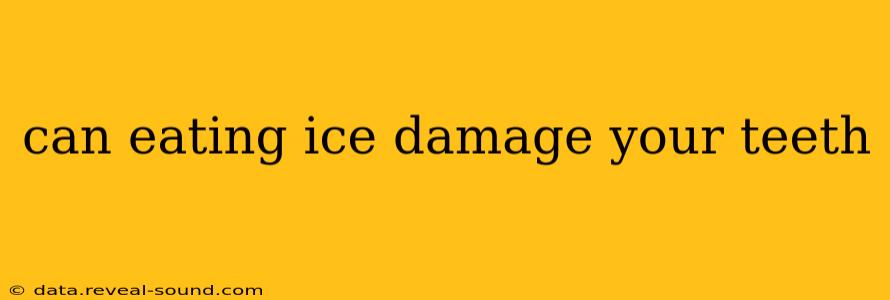Many of us enjoy the refreshing crunch of ice, especially on a hot day. But is this seemingly harmless habit actually damaging our teeth? The short answer is: yes, it can. While the occasional ice cube probably won't cause significant harm, regularly chewing on ice can lead to several dental problems. This article explores the potential damage and offers tips to protect your pearly whites.
What Happens When You Chew Ice?
The enamel, the hard outer layer of your teeth, is the strongest substance in the human body. However, it's not indestructible. Chewing ice subjects your teeth to extreme forces, much like hitting them with a hammer. This can lead to:
-
Cracks and Chips: The most common consequence of ice chewing is the creation of tiny cracks or chips in the enamel. These imperfections can become entry points for bacteria, leading to cavities and further damage.
-
Fractured Teeth: In more severe cases, the force of chewing ice can cause a tooth to fracture completely. This can be extremely painful and require extensive dental work, potentially including a root canal or extraction.
-
Increased Tooth Sensitivity: Repeated exposure to the cold temperature of ice can make your teeth more sensitive to hot and cold foods and drinks. This sensitivity can be uncomfortable and persistent.
-
Worn Enamel: Over time, constantly chewing on ice can wear down the enamel, making your teeth more vulnerable to decay and discoloration. This can lead to a duller appearance and increased risk of dental problems.
Is it okay to eat a little bit of ice?
The occasional ice cube likely won't cause significant damage. However, habitual ice chewing should be avoided. Think of it like this: a single scratch on your car likely won't cause major damage, but repeated scratching will eventually lead to significant wear and tear.
How can I stop chewing ice?
Breaking a habit can be challenging, but there are strategies that can help:
-
Identify Triggers: Pay attention to when you crave ice. Is it boredom, stress, or a specific food pairing? Understanding your triggers is the first step to breaking the habit.
-
Find Alternatives: If you chew ice to satisfy a cooling craving, try substituting it with ice-cold water, popsicles (in moderation), or frozen fruits.
-
Stay Hydrated: Sometimes, the desire for ice is a sign of dehydration. Ensure you're drinking enough water throughout the day.
-
Mindfulness: Practice mindful eating. Pay attention to the sensation of chewing and try to notice when you're unconsciously reaching for ice.
Can ice damage fillings or crowns?
Yes, chewing ice can damage dental fillings and crowns. The force can dislodge fillings or cause them to crack, potentially exposing the underlying tooth to decay. Similarly, crowns can chip or break from the impact.
What should I do if I crack a tooth while chewing ice?
If you suspect you've cracked a tooth, schedule an appointment with your dentist immediately. Prompt treatment can often save the tooth and prevent further complications.
How can I strengthen my tooth enamel?
While you can't make your enamel significantly stronger, maintaining good oral hygiene is crucial to protecting it. This includes brushing twice daily with fluoride toothpaste, flossing regularly, and using a mouthwash. Furthermore, a balanced diet rich in calcium and phosphorus can support healthy tooth enamel.
By understanding the potential consequences and taking steps to avoid excessive ice chewing, you can protect your teeth and maintain a healthy, bright smile for years to come. Remember, moderation is key!
